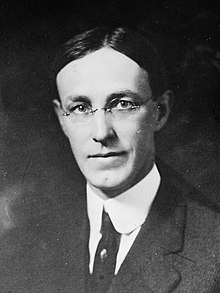Loading AI tools
American philosopher and educator From Wikipedia, the free encyclopedia
Alexander Meiklejohn (/ˈmiːkəlˌdʒɒn/; 3 February 1872 – 17 December 1964) was an English-born American philosopher, university administrator, educational reformer, and free-speech advocate, best known as president of Amherst College.[1][2]
This article includes a list of general references, but it lacks sufficient corresponding inline citations. (December 2009) |
Alexander Meiklejohn | |
|---|---|
 Meiklejohn sometime before 1912 | |
| Born | 3 February 1872 Rochdale, Lancashire, England |
| Died | 17 December 1964 (aged 92) Berkeley, California, U.S. |
| Education | Brown University (BA, MA) Cornell University (PhD) |
Alexander Meiklejohn was born on February 3, 1872, in Newbold Street, Rochdale, Lancashire, England. He was of Scottish descent, and the youngest of eight sons. When he was eight, the family moved to the United States, settling in Rhode Island. Family members pooled their money to send him to school. He earned bachelor's and master's degrees at Brown University, graduating Phi Beta Kappa, and completed his doctorate in philosophy at Cornell in 1897. At Brown, he was a member of Theta Delta Chi.[1][2]

In 1897, Meiklejohn began teaching at Brown. In 1901, he became second dean of the university, a position he held for twelve years.[1][2] The first-year advising program at Brown bears his name.[3]
From 1912 to 1923, Meiklejohn served as president of Amherst College.[1][2] His presidency ended with his forced resignation for trying to apply his reforms, and thirteen students refused their diplomas that year in protest.[1]
Although he was offered the presidency of other colleges, Meiklejohn proposed to open a new, experimental liberal arts college. He was unable to develop adequate funding for creating an entirely new school, but he was invited by Glenn Frank, new president of the University of Wisconsin, to create the University of Wisconsin Experimental College there, which ran from 1927 to 1932.[1][2] He retired from the University of Wisconsin in 1938, having already moved to Berkeley, California.[4][5] He was a cofounder of the School of Social Studies in San Francisco,[1] an adult education program focusing on "great books" and American democracy.[2] In 1965, the school became the Meiklejohn Civil Liberties Institute (MCLI),[6] a "non-governmental organization" run by Ann Fagan Ginger.[7]
In 1945, Meiklejohn was a US delegate to the founding meeting of UNESCO in London.[1]
Meiklejohn died at age 92 on December 17, 1964, in Berkeley, California.[1][2]
Meiklejohn was known as an advocate of First Amendment freedoms and was a member of the National Committee of the American Civil Liberties Union (ACLU).[8] He was a notable proponent of the link between freedom of speech and democracy. He argued that the concept of democracy is that of self-government by the people. For such a system to work an informed electorate is necessary. To be appropriately knowledgeable, there must be no constraints on the free flow of information and ideas. According to Meiklejohn, democracy will not be true to its essential ideal if those in power are able to manipulate the electorate by withholding information and stifling criticism. Meiklejohn acknowledges that the desire to manipulate opinion can stem from the motive of seeking to benefit society. However, he argues, choosing manipulation negates, in its means, the democratic ideal.[9] Eric Barendt has called the defense of free speech on the grounds of democracy "probably the most attractive and certainly the most fashionable free speech theory in modern Western democracies".[9]
In Nixon v. Shrink Missouri Government PAC, 528 US 377 (2000), at 401, Justice Stephen Breyer, joined by Justice Ruth Bader Ginsburg, wrote a concurring opinion in support of regulation. In response to protestations that such laws violate citizen's rights to free speech, Breyer held that there were free speech arguments on both sides of the issue. He said that properly framed regulations limiting monetary contributions could substantially expand the opportunity for freedom of expression rather than limit it. He pointed out that the integrity of the electoral process needs to be maintained since that is the means by which a free society translates political advocacy into concrete political action, and that regulating the financing of political campaigns is integral to that advocacy. In doing so, Breyer cited Meiklejohn's interpretation of the First Amendment which gives emphasis to public need rather than individual prerogative.[citation needed]
The American Association of University Professors (AAUP) established the Alexander Meiklejohn Freedom Award to honor his work.[1]
He received the Rosenberger Medal in 1959. Meiklejohn was selected by John F. Kennedy to receive the Presidential Medal of Freedom, which was presented by Lyndon B. Johnson shortly after Kennedy's death.[1]
Meiklejohn wrote books from 1920 to 1960:
Seamless Wikipedia browsing. On steroids.
Every time you click a link to Wikipedia, Wiktionary or Wikiquote in your browser's search results, it will show the modern Wikiwand interface.
Wikiwand extension is a five stars, simple, with minimum permission required to keep your browsing private, safe and transparent.